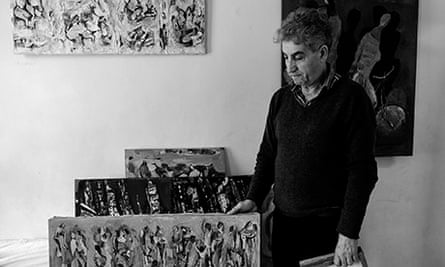I walk down a dimly lit corridor and have my papers handed to me before guards take my fingerprints. I join a group of people, and we are led down tunnels surrounded by unfamiliar sounds and smells. In the dark, we are crammed on to a raft while what sounds like a ship's horn blasts in the distance. Next we are led into a medical area, where we are ordered to dip our hands in disinfectant before liquid is sprayed on our faces.
This is not what usually happens in the vaults under Waterloo station in London, but I was visiting Seeking Sanctuary, which seeks to dispel preconceptions about asylum seekers by encouraging the public to spend an hour in their shoes.
This "immersive experience", curated by the British Red Cross, uses music and drama to convey the sense of loss experienced by those who have been forced to leave their homes at a moment's notice. We hear powerful stories of refugee flight and life in camps.
For some, the messages of Seeking Sanctuary revive memories of their own experience. Ayman Hirh and Hassan Abdall, recent Syrian arrivals in the UK, are the subject of an exhibition by Paul Conroy that concludes the event. An experienced war photographer, Conroy was wounded in the attack that killed journalist Marie Colvin in Homs in February 2012.
Abdall, a successful artist and university lecturer based in Damascus, joined us on the tour. He fled Syria when violence erupted in 2011. What are his thoughts on Seeking Sanctuary? "Sometimes people think that seeing something like this will make you think more about the terrible times that you have had. But it's not like that, because you are already thinking about it. You live with it, you eat with it, you sleep with it. It's always there. I'm so proud to be a part of this." Abdall came to London alone; his wife and teenage son remain in Damascus.
I speak to Hirh as he stands among photos of his family. He says he is adjusting to life in Edinburgh, and is emotional about having his story exhibited. It is a "lovely moment but a sad moment", he explains, sad because the Syrian people never expected to be refugees.
As his three-year-old twin boys playfully chase each other around the room, Hirh says that while he is happy his family is safe, he feels sorrow for the generation of children who are missing out on an education and risk being left illiterate because of the conflict.
Seeking Sanctuary ran for two days, and places were booked up quickly, mostly by supporters of the British Red Cross and members of the public. Nick Scott-Flynn, the organisation's head of refugee services, says: "The main purpose [of the event] is to help people empathise and connect on an emotional level with the experience of being a refugee." It offers a new way to explore such a politically charged issue, he adds.

But are people who sign up for the experience already invested in the plight of the refugees? Is the British Red Cross preaching to the converted? Scott-Flynn believes creating a personal connection to the issue is important, irrespective of a person's views on aid and immigration. "If you can have a profound effect on people's empathy it can mushroom," he says. If the only thing a participant does is mention it at a dinner party, it has had some success.
Poverty simulations are not new. A similar event by the UN refugee agency became a regular fixture at the World Economic Forum's annual meeting in Davos, Switzerland, until it ended last year. Refugee Run invited delegates to "encounter, first hand, some of the struggles and choices that refugees and [internally displaced people] must face for survival".
This year, Davos delegates had the chance to experience Struggle for Survival, set up by Global Hand, which offered a broader focus on poverty. The event proved popular: the UN secretary general, Ban Ki-moon, said it was "beautifully done"; Sir Richard Branson suggested "everyone should do this".
Global Hand, a non-profit matching service helping NGOs and businesses form partnerships, also staged a drop-in poverty simulation exercise in central London during the 2012 Olympics. The event was visited by schools, businesses and NGOs.
The organisers have clear objectives – they want these events to educate, evoke empathy and empower participants to take action. Empathy is the main goal behind such simulations, says Global Hand's director, Ben Solanky, but it is the hardest to measure. While the project is popular, he believes its impact on public opinion may be felt only in the long term.
Aside from theatrical simulations, online games can allow players to "experience" poverty, or even protect villages and cities from disaster. Unmanned, by the Italian company Molleindustria, puts the gamer in the position of a soldier whose job is to deploy bombs. While such games are mostly aimed at children, and help raise awareness of global issues, most fail to evoke empathy as effectively as theatrical simulations.
As the global economy continues to struggle, people are turning their focus to issues closer to home. However, simulations that help draw attention to global suffering could play a vital role in reversing the decline in charitable giving.
Comments (…)
Sign in or create your Guardian account to join the discussion